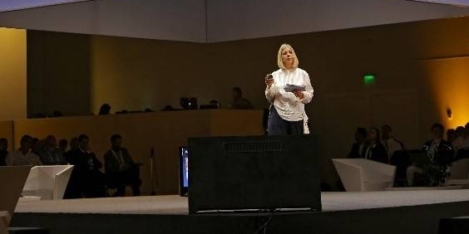To provide the best experiences, we use technologies like cookies to store and/or access device information. Consenting to these technologies will allow us to process data such as browsing behaviour or unique IDs on this site. Not consenting or withdrawing consent, may adversely affect certain features and functions.
The technical storage or access is strictly necessary for the legitimate purpose of enabling the use of a specific service explicitly requested by the subscriber or user, or for the sole purpose of carrying out the transmission of a communication over an electronic communications network.
The technical storage or access is necessary for the legitimate purpose of storing preferences that are not requested by the subscriber or user.
The technical storage or access that is used exclusively for statistical purposes.
The technical storage or access that is used exclusively for anonymous statistical purposes. Without a subpoena, voluntary compliance on the part of your Internet Service Provider, or additional records from a third party, information stored or retrieved for this purpose alone cannot usually be used to identify you.
The technical storage or access is required to create user profiles to send advertising, or to track the user on a website or across several websites for similar marketing purposes.
 Members of the British Institute of Facilities Management have today voted to approve its Board’s recommendation to change the Institute’s name to the Institute of Workplace and Facilities Management (IWFM). A Manifesto for Change unveiled by Chairman Steve Roots on 1 March which set out to reframe facilities management by emphasising its ability to make a real contribution to organisations’ performance has been resoundingly supported by members who today voted overwhelmingly to adopt the new name.
Members of the British Institute of Facilities Management have today voted to approve its Board’s recommendation to change the Institute’s name to the Institute of Workplace and Facilities Management (IWFM). A Manifesto for Change unveiled by Chairman Steve Roots on 1 March which set out to reframe facilities management by emphasising its ability to make a real contribution to organisations’ performance has been resoundingly supported by members who today voted overwhelmingly to adopt the new name.













 There is a critical need for to simplify the regulatory framework designed to improve energy efficiency in commercial buildings finds a recent report from the Environmental Industries Commission (EIC) Carbon Management & Sustainable Buildings Working Group. It also suggests that Brexit could act as a spur to rethink the right combination of policies to reform enforcement systems. The report, Improving non-domestic energy efficiency after Brexit, one of a series EIC is publishing setting out its members’ views on the impact of Brexit on environmental policy and how policy should evolve after the UK leaves the EU, covers the breadth of energy efficiency policy for non-domestic buildings. As part of its research, EIC surveyed England’s local authorities, who have responsibility for trading standards, finding that out of those that responded (122 out of 149), no local authorities have been issuing fines for failing to display Energy Performance Certificates or Display Energy Certificates.
There is a critical need for to simplify the regulatory framework designed to improve energy efficiency in commercial buildings finds a recent report from the Environmental Industries Commission (EIC) Carbon Management & Sustainable Buildings Working Group. It also suggests that Brexit could act as a spur to rethink the right combination of policies to reform enforcement systems. The report, Improving non-domestic energy efficiency after Brexit, one of a series EIC is publishing setting out its members’ views on the impact of Brexit on environmental policy and how policy should evolve after the UK leaves the EU, covers the breadth of energy efficiency policy for non-domestic buildings. As part of its research, EIC surveyed England’s local authorities, who have responsibility for trading standards, finding that out of those that responded (122 out of 149), no local authorities have been issuing fines for failing to display Energy Performance Certificates or Display Energy Certificates.

















June 22, 2018
Organisations are easily distracted from the task of creating a great workplace strategy
by Chris Hood • Comment, Facilities management, Property, Workplace design
(more…)